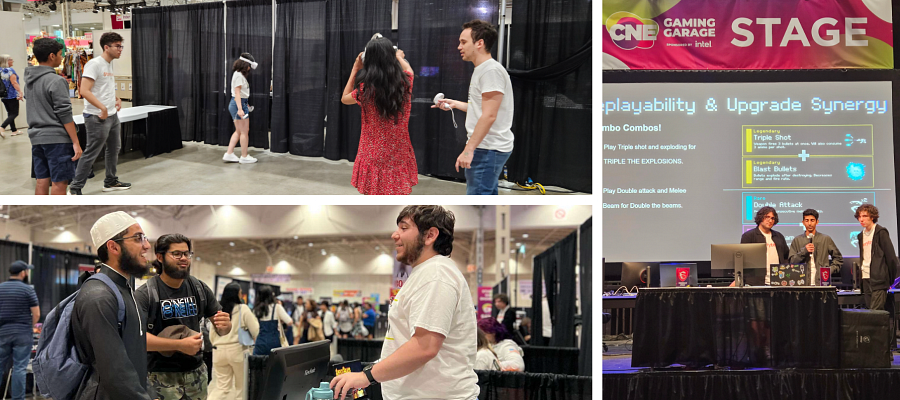It was a Game—Development program takeover at this year's Canadian National Exhibition (CNE)! From running booths to presenting live on stage, a group of students in the program showcased the games they created to attendees—an incredible opportunity that allowed them to demonstrate their skills and passion for their work.
How did this all come together? It dates back to the summer when Brian Sinasac, the program coordinator, heard about this opportunity and asked his students if anyone wanted to present their work at the CNE. With a short timeframe to prepare, four groups, each made up of three to six students, agreed to take part, with the majority choosing the games they worked on as group projects within the program as the ones they would present.
“Most of our day was running our booths, as many people came through the area and played them throughout the day. However, many of us took the opportunity to network with the other students and get to know them,” explains Anthony De Fazio, currently in his third and final year of the program.
Anthony’s group had been working on a game over the summer that they showcased at the CNE. While there, they also had the opportunity to present their project to an audience. “We went on stage and had a live demo of the project and a small slideshow presentation about the development process and how it came to be, which was pretty cool,” he shares.
Reflecting on the entire experience, he adds, “The experience was incredible, and I'm very grateful I got to experience it with my peers. There was a lot to like, but my favourite part was just watching the public play and enjoy our games. Game development isn't easy, and putting these projects together required many months of hard work and determination, but watching people play and have fun made it all worth it.”
Ronan Daniel, also in his last year of the program, had similar sentiments about the opportunity. He explains, “Showing our games to the public was my favourite part; seeing people of all ages coming to our booths, getting excited and enjoying the games we've worked so hard on, was very affirming as a game dev. Seeing other people, who you don't even know, having such emotive reactions to an experience you've hand-crafted is such an elating feeling—you just have to feel it to understand.”
The group of students also had the chance to meet and play the games made by students from other schools, which is something Benroy Chayson, currently in the program’s last year, highlighted as a stand-out component of this opportunity.
![studnets showcasing their games to the crowds at the CNE]() HOW THIS OPPORTUNITY ENHANCED THE PROGRAM EXPERIENCE
HOW THIS OPPORTUNITY ENHANCED THE PROGRAM EXPERIENCE
The chance to display your work to the public at a large-scale event like the CNE is an exceptional experience, especially in garnering exposure and feedback. This is something Ronan highlights, as his team created a game over the summer outside of class that they had not shown many people. “Being able to go to big events like the CNE is very enlightening to see how people feel about and play the games we make. It's a huge learning experience,” he says.
Similarly, Anthony recognizes the value of receiving feedback from a large group, sharing, “These opportunities are some of the most unforgettable parts of the program. The majority of our time is spent developing games and showcasing them to only small groups of people on campus and in class, so getting the chance to bring these games out into the spotlight for many people to see is immensely rewarding and also provides us with lots of good data to further improve the games.”
Additionally, Benroy points out how this experience allowed for a more diverse crowd to interact and play the games students created instead of only the video game community, which brought a broader perspective that is not always easy to obtain. “Quite literally anyone can come by your booth and play, ranging from someone who has never held a console before to hardcore players, and from there, you can gauge how your game performs in the eyes of the general public,” he explains.
The connections made while there is also something Benroy acknowledges as a beneficial element to attending. “I think that opportunities like this are crucial for us grassroots as we can make connections with other people that are already in the industry or going into the industry; we are social creatures at our core, so linking with more experienced members of the industry allow us to gain insight to more in-depth knowledge about the workings of the machine.”
We are incredibly proud of all the Game—Development students who took part in this opportunity to showcase their work, as their dedication, hard work, and creativity were on full display alongside their games.
Article by: Alexandra Few
Check out and subscribe to our Storyteller newsletter and Storyteller In-Depth Podcast for more great stories from the School of Communications, Media, Arts and Design.

 HOW THIS OPPORTUNITY ENHANCED THE PROGRAM EXPERIENCE
HOW THIS OPPORTUNITY ENHANCED THE PROGRAM EXPERIENCE